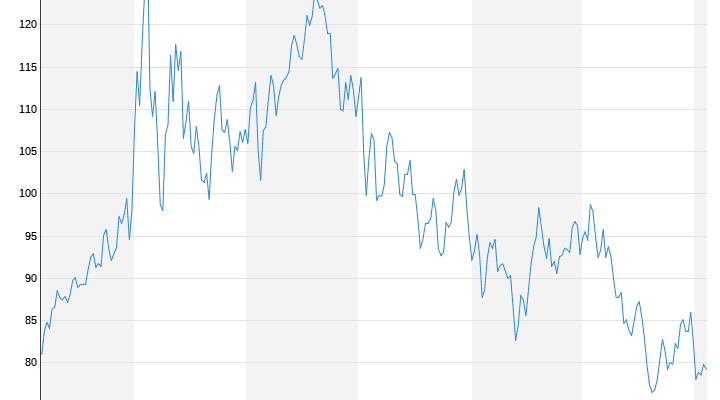Prices drop significantly
Putin threatens defeat in energy poker
By Jan Ganger
1/9/2023 3:13 p.m
Mild winter, deliveries from Norway, new liquid gas terminals: the situation in Germany is easing on the energy market. Did Vladimir Putin gamble?
Since the attack on Ukraine, Russian President Vladimir Putin has been using energy supplies to Europe as a means of exerting pressure. His calculus: to create bottlenecks by cutting supplies and thereby force Europe to end the sanctions against his country and to stop arms deliveries to Ukraine. Its most powerful weapons: the gas giant Gazprom and the oil giant Rosneft. But right now it looks like Putin is losing the poker game.
Europe’s gas storage facilities are well stocked. Oil and gas prices have now fallen from their peaks to pre-war levels. Europe has become largely independent of Russian natural gas. Germany replaces it with deliveries through the pipeline to Norway and LNG transports by ship from other countries. This is particularly important given that before the war, Germany had obtained the lion’s share of its gas from Russia through the Nord Stream 1 Baltic Sea pipeline.
Because of this dependency, the traffic light coalition could not bring itself to stop the import of Kremlin gas, despite the Russian invasion of Ukraine. The fear that entire industries would have to stop production and that Germany would plunge into a severe economic crisis was too great.
But Putin put Europe on withdrawal and, above all, forced German industry and the federal government to break away from Russian energy. First, before the attack, Gazprom had its storage facilities in Germany almost empty. During the war, supplies through Nord Stream 1 were gradually curtailed and eventually stopped altogether. The gradual withdrawal gave the EU and Germany time to look for alternatives and prepare for a complete halt to Russian supplies.
Netzagentur boss is confident
Russian gas is currently still flowing into the EU, for example to Hungary. But the total amount is much smaller than before the beginning of the war. In addition, the EU has completely stopped importing Russian oil and Russian coal. This is a problem for the Kremlin because Russia derives most of its revenue from energy sales. Deliveries to the West cannot easily be replaced by other customers because, for example, the necessary pipelines are missing. In addition, Russia has to grant large discounts. This can be seen, for example, in the Russian oil variety Urals. Typically, a barrel costs about 60 US cents less than a barrel of North Sea Brent. It’s currently around $26 cheaper.
The well-stocked gas storage facilities reduce the Kremlin’s room for manoeuvre. To classify: The fill levels in Germany are around 90 percent. “They were rarely that high in January,” says the head of the Federal Network Agency, Klaus Müller. “Despite all the remaining uncertainty: I don’t expect anything else to go wrong this winter.”
There are several reasons for this. Germany has bought a lot of gas in the past few months in order to go into the winter with well-stocked storage facilities. The mild winter is a big help. According to the ntv weather expert Björn Alexander, January should also be significantly warmer than the long-term average. That could also be the case in February. “For this month, long-term forecasts predict warmer temperatures than usual – however, there is a large element of uncertainty with these forecasts,” said Alexander.
In addition, industry and households save energy. According to the Federal Network Agency, a total of 14 percent less gas was consumed in Germany in 2022 than in 2021. The extension of the service life for nuclear power plants and the later phase-out of coal production also contribute to easing the supply situation. In addition, German companies are increasingly buying coal from abroad. Germany is now a good customer of South Africa.
inflation is going down
Against this background, things are currently looking good for the coming winter. The goal is to go into spring with 40 percent full stores. Netzagentur boss Müller expects that the memory level will even be more than 50 percent at the end of winter.
In order to avert an energy crisis next winter, the federal government is pushing ahead with the development of import infrastructure so that liquid gas can be transported to Germany by ship. The government has chartered five floating LNG terminals. One of them has already started operations in Wilhelmshaven. The privately financed plant in Lubmin in Mecklenburg-Western Pomerania is scheduled to open this week.
This is not to say that Putin has not harmed Europe and Germany. Energy prices, which were at times record high, have played a key role in causing inflation to pick up momentum. But she’s going back now.
A lot can still happen. For example, cold snaps and delivery bottlenecks can catapult energy prices back up. A horror scenario: the gas pipeline from Norway could be damaged like the unused Nord Stream 2 line. Meanwhile, China’s end to the strict zero-Covid strategy should mean that industry in the world’s second-largest economy will recover – and that energy consumption and thus prices will rise. But for now it looks like Europe is over the worst in the energy poker.
